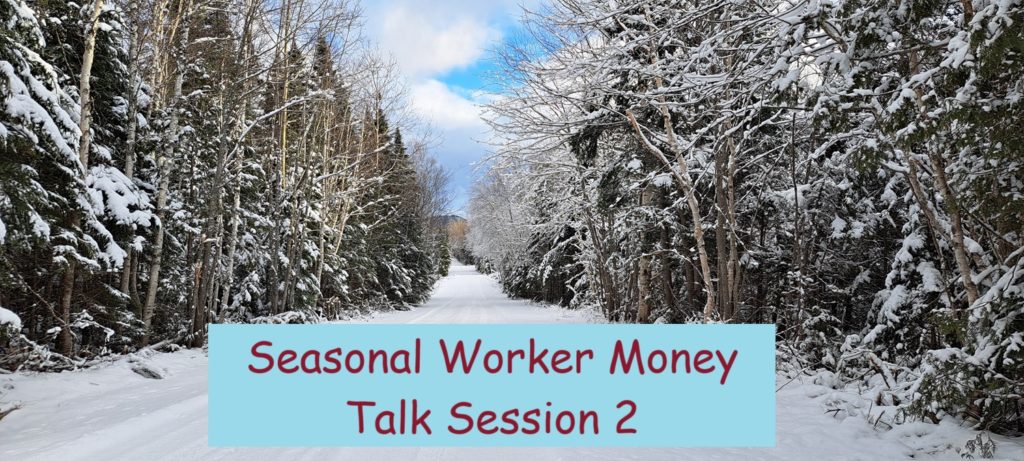Seasonal Worker Money Talks Session 2
Seasonal Worker Money Talk Session 2
Yeah! Here we are for:
Seasonal Worker Money Talk Session 2
Review:
How did last week go?
Did you start budget documentation in some form?
Did you notice anything about your internal thoughts with money?
Could you sign into all your money related accounts?
Did you do anything to tidy up organization?

Topic #1 – Budgets
Why.
Why are we doing the budget?
Why is this such a big deal?
There are many opinions. Some will say to count every penny. Some will say to buy the coffee because that will not stop you from attaining wealth.
Everyone is right to some degree.
When your “young” (age doesn’t matter – you can be 20 and thinking about this or you can be 40 and thinking about this) in starting to take your finances seriously and want to help dictate the trajectory of them –
Knowing how much money you have coming in and going out is a key part of having results.
Someone who once spoke those words, I barely have $100 until my next paycheck might be saying in two years time, wow, I can’t believe it, I’m just about to surpass $5,000 in savings!
Remember all this starts with one small habit and then stacking that habit with another habit with another habit.
Topic #2 – Budgets Continued
Budgets are a tool you can use to your advantage to control your emotions.
To the questions from last week:
When can I buy myself something nice just because?
How much do I spend on a gift?
When it is ok to make a big purchase?
Should I take out a loan?
Can I afford a loan?
These are all great questions for our seasonal worker money talk sessions.
Knowing your expenses, what you are budgeting, gives you statistical evidence to inform you of wise decisions. You can use that information to tell your brain to stop freaking out.
Those feelings of guilt after a purchase can be eliminated when you have an idea if what you are doing is reasonable or unreasonable.
You have a plan and are learning what to do.
Action is one of the only sure ways to address stress and anxiety.
Money and having money is almost completely within our control.
That might seem like such a wild and crazy statement. But by and large, we know we need money. We can take that knowledge and use it to our advantage.
Key distinction – budget vs tracking
Most I know along the financial independence journey go through reaching different thresh holds.
There’s a time in life where saving $500 is a huge accomplishment.
Then $1,000. Then $5,000. Then $10,000. Then if you can save $20,000, why not try for $50,000?
See the how the jumps getting bigger?
Once you start/accelerate positive habits they have a chance to grow and gain momentum. As we reach certain thresholds our mindsets can start expanding. “All of a sudden” we are some where that perhaps five years ago we could have never imagined ourselves being.
You are not the same person you were at the beginning of this year. Think of how much knowledge you have the chance to accumulate and let compound over the next five years. And then on and on. If you become a life long student and learner.
Remember, knowledge is compoundable too.
Tangible Action Step for this week:
(If you are still working on getting your budget going – that’s ok! Keep doing that. Don’t feel discouraged for whatever stage you’re at. Internal judgment often silently suffocate our dreams. Just keep going!)
Put time into thinking about a budget/allocation system that is going to appeal to you.
How to start figuring out how much you can spend in different categories that are important to you.
Analogy for those who do well with visualizations.
Many of us in these seasonal worker money talks are a bunch of outdoorsy people. We all might want to hike a mountain. Many mountain summits have multiple routes to the peak.
And likely, if we all looked at our boots once we got to the top we’d find a variety of pairs. There are a variety of tools you can use to achieve your goals. Don’t allow decision overwhelm to stop you from moving forward.
(Remember – the method that you use is the method that will actually get you results!)
Once you get half a clue how much life costs you, you can then figure out how much you can spend on presents, books, clothes, travel and all the other things of life.
Options to set up categories/buckets/allocations of your funds.
1) Call you bank and most places you can set up sub-accounts:
So you have your savings account. Then you can have:
Club Rent:
Club Gifts:
Club Fun Things:
Club Donation:
Club Emergency:
You can then easily transfer this money around. It also keeps you active in thinking about how much you have and keeping an eye on it.
2) Envelope Stuffing:
Physically put money in envelopes labeled: Gifts, Rent, Food, etc.
I don’t actually think this is a good suggestion for us seasonal workers. We move around too much and chances of losing things, having an envelope get misplaced seem to great for me to recommend.
However, maybe your situation changes and you find this method effective for you. People do use it.
3) Establish a separate Bank Account for all the variable costs:
It’s usually pretty easy to transfer money online now adays. You could consider having direct deposit into your main savings account. Then if say you are paid bi-weekly, you could go in and physically click ‘transfer $50 to emergency’ & ‘transfer $10 to gifts’ etc.
Once you do the initial set up, this is either a bi-weekly task or you set this up with automatic transfers. Easy peasy.
4) Have a number in your account that you reach as your minimum threshold:
Maybe this is $5000 in between jobs.
Say your emergency fund is to never dip below $2000.
You have then have $3000 buffer.
Then say it costs you $1000 a month to buy food & rent.
You now have $2000 buffer.
Then say you want buy $50 of gifts.
You now have $1500 buffer.
Then say you want to do fun things with friends @$500.
You now have $1000 buffer.
At this point you get picky about if you do or don’t something or what you think your chances of other unexpected expenses are.
The most important thing is that $2000 never.ever.ever.ever gets touched.
An emergency is not car tires. That is an anticipated expense. You know it’s coming. It’s part of being a responsible car owner.
An emergency is not a new back pack. You know you will have to replace gear – this is a planned purchases account.
An emergency is not extra dinner because it’s your cousin’s special only ever going to graduate once. That is a planned occurrence and can come out of the buffer money.
Then –
At the end of the following season that emergency fund is $2500 and your total threshold is $5500. You keep adding to it every season. It grows. You see this grow and that feels good.
People often ask if there is a secret to life.
Sorta. Yes.
Spend less than you earn.
Topic #3 – Be Aware of Emotions
We’re going back to talk about emotions…again.
Our upbringings play such a huge role in how we view this and what we think about money saving goals.
Achieving (and also even just defining our) financial goals starts with so much of what we are thinking in our heads.
Those subtle thoughts that we have from childhood (money doesn’t grow on trees, you need a “good” degree to ever make money – what even is a “good” degree? There is no major that you graduate with that is titled “Good Degree.”)
We’re talking about this again because being aware of our minds wanderings and beliefs is what will carry each of us to our chosen lifestyle.
I got so many nuggets of inspiration from just this one Jim Rohn talk – here are a few (paraphrased a little bit):
Lifestyle is learning how to live your life. Some people have money but they don’t know how to spend it. Some people have time but they don’t know how to spend it.
There is a high cost to excuses for the regrets they bring.
Gardeners nurture seeds. Plant seeds in our thoughts. Nurture them with discipline and action.
To have more – you become more.
Don’t wish it were easier – wish you were better.
Don’t wish for less problems – wish for more skills.
This Weeks Action Step Review:
1) Continue working on the habit of tracking all your $ in and $ out.
2) Make sure you are able to easily sign into any and all money related accounts.
3) Find one positive source of inspiration and bring that into your life at least once per week.
4) Put time into figuring out an allocation system that works for you.
5) Continue to observe yourself and if you are kind or cruel to your internal thoughts. Continue believing you are worthy of good things to happen to you.
If you are interested in this seasonal worker money talk, this is one of our travel budgets in action. Here is exactly what it cost us for a month of travel in Yucatan, Mexico.
 Previous Post
Previous Post Next Post
Next Post
[…] You can easily set up bucket saving (like we talked about in Session 2!) […]
[…] Seasonal Worker Money Talk Session 2 […]
[…] Seasonal Worker Money Talk Session 2 […]
[…] Seasonal Worker Money Talk Session 2 […]